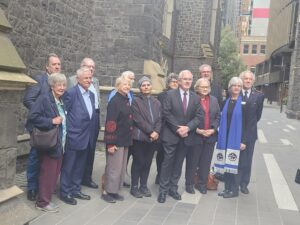
By Graham Stanton
21 February 2022
The statistics are dire. In 2021 the Youth Ministry Futures research project identified an “appropriate model of youth ministry” in less than 30 per cent of the parishes in the diocese. Sixty-six parishes have no teenagers at all. Others have young people in the congregation, but the ministry is either unhealthy or holds little hope for the future. Many have insufficient plans for discipling young people, or have little or no outward vision for connecting with young people outside the church. Only 13 parishes have ministries that connect with more than 30 young people. The remaining 104 parishes surveyed had an average of eight young people each.
These numbers aren’t enough to maintain the church as an institution, let alone fulfil our mission of making the word of God fully known.
So whose job is it to fix this?
We have a diocesan youth ministry consultant, perhaps it’s his job? Though if the heart of ministry is the parish, maybe the responsibility lies with vicars? Perhaps then that’s a collective sigh of relief we hear from those vicars fortunate enough to have employed a youth minister, or at least found a willing volunteer. The rest of us can rest easy knowing that there’s at least “someone” who can do “something” for the young people! Or perhaps the real responsibility lies with the parents? Surely youth ministry, like charity, begins at home.
Early in 2022 a new Children’s and Youth Ministry working group was established by Archbishop in Council to develop a proposal for a Diocesan office. This role would be to effectively plan for, resource, and support growth in the number of children and young people involved as active disciples in the parishes of the diocese. Maybe then it’s the job of the working group to fix children’s and youth ministry? At least until we’re able to offload the job to a newly formed Diocesan Office.
Trying to identify who is responsible for youth ministry can quickly descend into a blame-game. And if we do identify a “culprit”, then the burden of responsibility on those individuals can be crushing.
But there’s also a bigger loss here. If we do manage to identify someone to off-load youth ministry onto, the rest of us miss out on the glorious privilege that belongs to each one of us: sharing Jesus with the next generation.
Psalm 78 invites all of God’s people to take our part in the ancient relay of intergenerational faith transmission.
In this long recount of Israel’s years in the wilderness, despite the repeated faithlessness of God’s people, God continues to meet them with mercy and grace.
We see verses 37-39 encapsulate the story, saying:
Their hearts were not loyal to him, they were not faithful to his covenant.
Yet God was merciful; he forgave their iniquities and did not destroy them.
Time after time he restrained his anger and did not stir up his full wrath.
He remembered that they were but flesh, a passing breeze that does not return.
The church’s engagement with young people can tell a similar story. Throughout history there have been many times when the church has failed in her responsibility to share the faith with the coming generations. Yet there have been many times when God has graciously worked through ministry with children and young people to bring new life to the church and blessing to the world.
Despite human faithlessness, the Lord remains faithful. Despite everything that God’s people do, God continues to meet us with mercy and kindness. That’s the message at the centre of Psalm 78: God is with us, full of forgiveness, patience, and steadfast love.
Our privilege is to hand this good news on to the next generation.
Psalm 78:3-6 describes a great relay race of intergenerational faith transmission: our “ancestors” handed on the faith to us, then we hand on the faith to “the next generation”, our children. Looking further forward, verse six speaks of “the children yet to be born”, and then further still to “their children”. The great vision of Psalm 78 is to see the faith handed down to our children’s grandchildren!
Our task is in verse four: “we will tell the next generation the praiseworthy deeds of the Lord, his power, and the wonders he has done”.
We speak because God has spoken: “He decreed statutes and established the law in Israel”. By this the psalmist means more than just a list of instructions or the Ten Commandments. The law and statutes are the stories and embodiment of God’s relationship of love with his people.
So, who is given the grand privilege of sharing this good news with young people?
It is “my people”, “we”, who are part of “this generation”. That is to say, the privilege belongs to all of us! Sharing the faith with the next generation is not the job of any one individual, whether by offloading the responsibility to a youth leader or leaving parents to carry the burden alone. Children’s and youth ministry is the privilege and joy of the whole people of God.
Together we create a community of belonging where the good news of Jesus is heard and experienced: in word and sacrament, at home and away, in instruction and witness, through peers and leaders, by parents and young adults and elders and children together
We don’t do this just so the church as an institution would be preserved. Our goal is that young peoples’ lives would be changed. In the words of Psalm 78:7: “Then they would put their trust in God and would not forget his deeds but would keep his commands.” It’s not just being moral, but knowing God, and finding life in him.
The alternative isn’t neutral. Left without God’s word, verse eight says, they will be like their ancestors, stubborn and rebellious, with hearts not loyal to God, and spirits that are unfaithful to him.
The turning point in Psalm 78 comes in verse 65. “Then the Lord awoke as from sleep, as a warrior wakes from the stupor of wine”. After the seemingly unending cycle of our faithless disobedience the light of hope comes when God himself leaps into action.
God calls David from among the sheep pens. David is the unlikely leader everyone else had overlooked. David will be a shepherd, a good shepherd, who will lead with integrity and skill.
Though David continues the story of the ancestors, his story points forward to Jesus: the unlikely leader that others overlooked, the good shepherd who laid down his life for his sheep, and who leads us with integrity and skill into God’s good future.
Ultimately, we want to see flourishing children’s and youth ministries across the Diocese, not simply to preserve our institution. Instead, how will we serve young people with the word of Christ, for their good and the glory of God?
Dietrich Bonhoeffer wrote, “The future of the church is not youth itself but rather the Lord Jesus Christ alone. It is the task of youth not to reshape the church, but rather to listen to the Word of God; it is the task of the church not to capture the youth, but to teach and proclaim the Word of God.”
Trusting in the mercy and kindness and power of God we embark on this privilege and responsibility to share the good news of God, with the next generation, so that our children’s grandchildren would live to praise the Lord Jesus.
The Reverend Canon Rhys Bezzant, member of the General Synod Liturgical Commission, has written this prayer for Children’s and Youth Ministry in our Diocese. The members of the Children’s and Youth Ministry Working Group encourage every parish to use this prayer as we look to our Heavenly Father to bless our efforts in sharing Jesus with children and young people.
Dear Heavenly Father,
We exalt you that in every age you adopt into your family men and women, boys and girls, to live to the praise of your glorious grace. We thank you for your servants who have commended your works to the next generation, who declare your greatness for all to hear.
We thank you especially for caring adults in our church, for Sunday school teachers, for youth group leaders, and for all who speak on behalf of those with a quiet voice. We thank for those faithful people who have served CEBS and GFS, that repentance and faith might be preached in all the world. We thank you for those who taught us the Gospel.
Have mercy, dear Lord, on the Anglican Church in Melbourne, and bless us with ministries small and large that testify to your grace among our children and youth. Grant us the ability to nurture leaders who will themselves pass on the faithful deposit to those who come after them. And train us all in prayerful dependence, that we might look expectantly for signs of growth and opportunities for witness every day.
We pray in the name of your Son, Jesus Christ, who grew in stature and grace, filled with wisdom and the Spirit.
Amen.
The Reverend Dr Graham Stanton is a lecturer in practical theology and director of the Ridley Centre for Children’s and Youth Ministry.








One Response